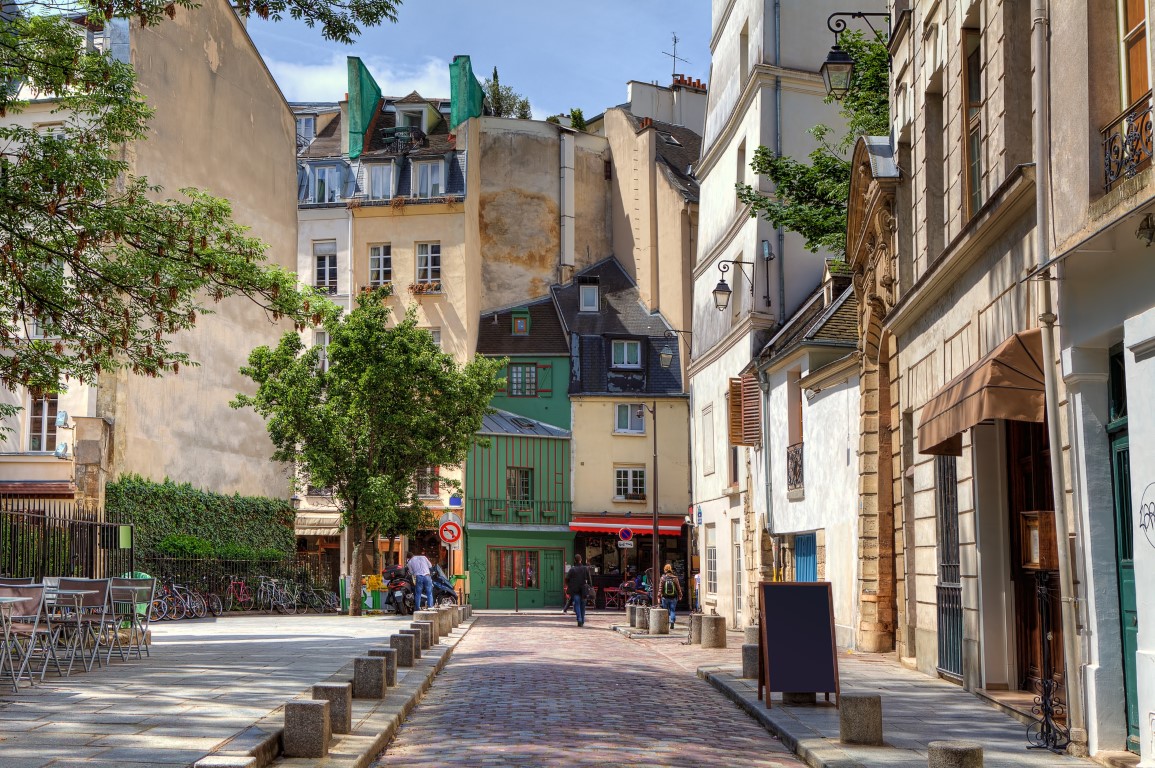As a writer, I knew Paris was known for its lights and love but every day I learn more about the stark differences in culture compared to America. Living here as a 27-year-old woman from the US has helped me create newer, healthier, European patterns for my life. Patterns that I doubt I would have formed if I wasn't living in Paris.
Moving to France was my dream and I knew I had to make it happen.
I would be lying if I said it wasn't truly a dream come true the day I received my long séjour valant titre (long stay tourist visitor visa) at my parents house in Texas after backpacking through Europe for the summer.
If this is also a dream for you, you're in the right place! Here is my experience of living 6 months in France and everything I wish I would have known sooner.
Picking the Right Paris Arrondissement (District)

When I first moved to Paris, I had only been there four times. The city charmed me obviously, but I knew very little about each district (called “Arrondissements”). There are 20 districts and each one has its own unique charm and personality. My first apartment was in the 7th arrondissement (considered “posh” by most locals) for the sheer fact that I knew it was safe for a young woman and it was close to the Seine with grass for my big dog.
Now that I know a little bit more of the city, here’s a breakdown of the districts I recommend living in as a young female expat:
- 1st Arrondissement (Louvre): “Center” of Paris. Home to iconic landmarks like the Louvre Museum and Palais Royal. It’s perfect for tourism, history, and art lovers. A little more expensive but worth it if you’re into being the nucleus of it all.
- 4th Arrondissement (Le Marais): Trendy and vibrant, Le Marais is known for its boutiques, art galleries, andLGBTQ+ scene. I had an Airbnb here at some point and really enjoyed it. Just no grass for my dog, Copper!
- 9th Arrondissement (Opera): Coolest up and coming area for restaurants and nightlife. Known for the Moulin Rouge, Palais Garnier opera, and Galeries Lafayette (huge shopping center where you can find just about anything from artisanal food to high fashion). Lots of young people and specialty coffee shops.
- 18th Arrondissement (Montmartre): Well known area because of the Sacré-Cœur Basilica and bohemian atmosphere. Very picturesque streets and beautiful, wide views of the city.
4 Tips to Find an Apartment in Paris

To be very honest, finding an apartment in Paris can be competitive and almost impossible if you don’t speak French but these tips can help!
1. Start Early
Begin your search well in advance and create accounts on local real estate websites ("SeLoger" or "PAP" are good ones!). If you are moving to Paris without having spent much time there, it might be wise for you to do some research and book out a few Airbnbs in advance to figure out the neighborhood and apartment size that suits you best.
2. Come Prepared
Make sure to come prepared with necessary documents: Landlords often require proof of income, references, and a French guarantor. You can use a local friend if you have one or family member that sponsored your visa. If not, you can use this website: www.garantme.fr
3. Have Enough Savings (if you're not working in Paris)
I personally work for myself as a private freelance photo editor and creator. If you are going to continue working on an extened tourist visa, it is important to have enough savings to live off of for the duration of your visa because it is forbidden by the French government to work while visiting (on a visa longer than 3 months).
4. Adjust Your Visa (if you get a job here)
If you are going to find a job, you must adjust your visa accordingly. You can find clear explanations to each visa here, though I will say that the website is often under construction! Patience is required to live in France but I'll share a little bit more about my visa story below.
Settling into Paris Quickly

If I could give you a solid list of things to do when you move alone, at the top of the list would be GO OUTSIDE. Apartments are beautiful (and landing one is a beautiful thing too, I can promise you that) but nothing compares to being out and about in the city and exploring the vibrancy of Paris.
You don’t have to make plans (in fact, I hope they get interrupted and life surprises you) but here are a few of my favorite places to visit and dine in the city:
- Many museums are free on the first Sunday of every month. Take advantage of this and grab a friend (or just a notepad) and visit one of the following from this list: TimeOut.com
- Picnic at Parc des Buttes-Chaumont. This is a huge beautiful park away from the tourist crowds in the 20th.
- Take a stroll down Canal Saint-Martin. Walk along the canal, browse boutiques, and enjoy the young, vibrant atmosphere (especially during the summer months).
- I cannot recommend enough learning the art of French cooking and immersing yourself in their culture through classes (I loved the sauce class I took with Cook’n with Class).
- Explore the local markets (there are many that vary on season) like Marché d'Aligre for fresh produce, bread, and antique finds.
- My favorite thing to do is compare French cuisine favorites. Croissants, wine, bread… There is an abundance of them and the creativity of the gastronomy here is endless. Everyone has a favorite boulangerie. Find yours!
- Don't overlook Paris at night! When the Eiffel Tower is gleaming and the streets are buzzing with people out with friends, hit the streets! Paris night tours are a fun way to see this side of the city if you're not sure where to start.
Learning French
Should you be fluent or at least proficient in French before moving? No way! Will significantly boost your chances of finding work and making friends? Definitely, but Paris is a very English proficient city. A simple “Bonjour, parlez vous Anglais?” has gotten me more relationships than trying to struggle through my beginner French language skills.
If you want to know a little bit more than this before arriving, Mondly is a great online learning app to learn French (or other languages). Once you're settled in Paris, you'll learn a lot faster if you swap to in-person lessons at a French school or opt to stay here on a student visa to learn French.
France Visas & Logistic

As an American, you can visit France for up to 90 days without a visa within a 180-day period for tourism or business purposes. Remember that this time limit is for the entire Schengen area, not just France. If you plan to stay longer or work in France, you will need to apply for an appropriate long-stay visa or work permit before your arrival. I learned this the hard way!
My personal story is that I fell in love (cue the music) and stayed with my boyfriend’s family while visiting France last summer. The 90-day limit to stay in the Schengen region quickly approached and I realized I needed a visa to stay. I did my research and though my boyfriend and I broke up, the people I created friendships and relationships with while integrating my life here assisted me in the process. I chose a long-stay visitor visa and followed the paperwork listed on the French embassy website.
If you'd prefer to come to France with a job already lined up, working as an Au Pair in Paris is a common route foreigners take to obtaining a French visa. An au pair is typically a young person who acts as a nanny taking care of another family's children. The difference between an au pair and a nanny is that an au pair typically lives with the family and should speak a different language than the hosts, so in this example, shouldn't only speak French. The reason for this is because the hosts want their children practicing another language with someone who is fluent.
Do keep in mind that France is not one of the countries that currently offers a digital nomad visa. If you dream of working remotely from Europe, browse through the list of European countries with remote worker visas to find your alternative to the French capital.
The Cost of Living in Paris

The cost of living in Paris can be high but it's manageable with careful budgeting (and it's no comparison to expensive cities like NYC or LA). Here are approximate monthly expenses for 1 person:
- Rent for a 1-bedroom apartment (they actually call it a 2-bedroom): €1,200 to €2,000
- Utilities (electricity, water, heating): €70 to €100
- Public transportation (get a monthly pass if you want to travel around the city often): €80
- Groceries (depending on how much you cook… Parisian apartments can have small kitchens!): €250 to €350
- Dining out: €15 to €30 for a meal at a mid-range restaurant
- Bars/Entertainment: €50 to €150
*These are rough estimates, and everyone’s lifestyle can significantly impact the actual cost of living!
Want to Live in Paris, Too?
I would say that living in Paris as a young adult American woman has been the experience of a lifetime. Being here I have had the incredible opportunity to immerse myself in a truly different culture than I grew up in in Texas.
I have grown more than I can state and really feel as though I'm thriving abroad. If I could give one piece of advice before moving, I would say: Embrace the Parisian way of life. Slow down. Savor. Let life interrupt you and take advantage of all the food, love, and history that this city has to offer.
Hero photo by depositphotos.com.










.png)
.png)